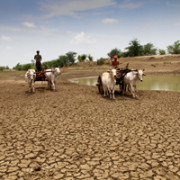
About Ulrich Volz
Ulrich Volz is a professor of economics and director of the Centre for Sustainable Finance at SOAS University of London.Mitigating climate-related sovereign risk to accelerate action on the climate emergency

Governments and financial authorities should implement financial sector policies to scale-up investment in climate adaptation and resilience
Foreign holdings of local currency bonds: A double-edged sword for emerging Asia

Local currency bond markets (LCBMs) have continued to develop in emerging Asian economies since the early 2000s, with foreign investor participation rising markedly since the global financial crisis of 2007–2008. LCBMs help to enhance domestic financial stability by enabling governments and companies to borrow in domestic currency.
Do persistent current account imbalances hamper regional and global growth?

Current account surpluses have persisted in a number of Asian and European economies throughout the global financial crisis and thereafter. Along with Germany, Japan has a decades-long history of recording current account surpluses. Due to rapid improvements in the competitiveness of its manufacturing sector, Japan has almost continuously recorded trade surpluses since the mid-1960s, and as a result, record current account surpluses (Shirakawa 2011).
COVID-19 and policy responses through the lens of global asset markets and capital flows

The coronavirus disease (COVID-19) pandemic and the resulting lockdowns have led to an unprecedented economic contraction and turbulence in financial markets, which initially caused the largest ever outflows of portfolio capital from emerging market economies (EMEs). Globally, governments have responded to the crisis with substantial fiscal stimulus packages. In addition, central banks around the world have eased monetary policies, with many EME central banks also implementing quantitative easing (QE) measures for the first time.
Exploring the link between climate change and sovereign risk

Climate change can have a material impact on sovereign risk through direct and indirect effects on public finances. In addition, climate change raises the cost of capital in climate vulnerable countries and threatens debt sustainability. Governments must climate-proof their economies and public finances or potentially face an ever-worsening spiral of climate vulnerability and unsustainable debt burdens.
COVID-19 highlights the need to strengthen environmental risk management and scale-up sustainable finance and investment across Asia

Like the rest of the world, Asia has been hit hard by the COVID-19 crisis. While some countries have been able to contain the spread of the virus relatively well, the disruption of supply chains, sharp decline in global demand, and the large-scale withdrawal of capital have led to severe economic contractions across the region.
Financial development and stability in the People’s Republic of China: Evaluating the policy challenges

The People’s Republic of China (PRC) has come a long way in developing its financial system, and it has done so at a speed that has been breathtaking. The country’s “big four” banks are now the four largest banks in the world by assets, while another 14 PRC banks make it into the top 100 largest banks. The PRC last year surpassed the euro area to become the world’s largest banking system by assets, and PRC banks are now major sources of dollar-denominated lending, not least as part of the country’s One Belt One Road initiative.
Green finance for sustainable investment

To place the Asian economies onto a sustainable development pathway requires an unprecedented shift in investment away from industries relying intensively on greenhouse gases, fossil fuels, and natural resources toward more resource-efficient technologies and business models. The finance sector will have to play a central role in this green transformation. Important aspects of green finance are sustainable investment and banking, where investment and lending decisions are taken based on environmental screening and risk assessment to meet sustainability standards, as well as insurance services that cover environmental and climate risk.
Monetary policy spillovers in emerging Asia

For a number of years, the central banks of the major advanced economies have pursued historically unprecedented ultra-low interest rate policies and negative interest rate policies. Facing the zero lower bound problem, they have also implemented various asset purchase programs, known as “quantitative easing,” with the aim of reducing long-term interest rates. There has been growing evidence that advanced countries’ unconventional monetary policies (UMPs) have caused significant spillovers to the financial markets of emerging market economies (EMEs).
The financial sector needs to be driving the green transformation

Many Asian countries have set ambitious targets for climate change mitigation. Governments all over the region are devising green growth strategies, aiming to reconcile economic growth with low carbon emissions as well as trying to limit other forms of environmental degradation such as soil, water, and air pollution. What is needed is no less than a “green transformation” to put green growth at the heart of development (OECD 2013). To achieve such a green transformation, large investments will be needed in renewable energy generation, energy efficiency, smart transportation networks, and many other areas that will help the shift toward sustainable patterns of production and consumption.


Search
Subscribe / Connect to Asia Pathways
Subjects
- Accelerating Progress in Gender Equality
- Addressing Remaining Poverty and Reducing Inequality
- Agriculture and natural resources
- Capacity development
- Climate change
- Economics
- Education
- Energy
- Environment
- Finance and Innovation
- Finance sector development
- Gender
- Globalization and Economic Stability
- Globalization, Environment, and Climate Change
- Governance and public sector management
- Health
- Human Capital Development for Inclusive Growth and Shared Prosperity
- Industry and trade
- Information and Communications Technology
- Infrastructure
- Making Cities More Livable
- Miscellaneous
- Population
- Poverty
- Private sector development
- Promoting Rural Development and Food Security
- Regional cooperation and integration
- Sanitation
- Social development and protection
- Strengthening Governance and Institutional Capacity
- Subjects
- Tackling Climate Change, Building Climate and Disaster Resilience, and Enhancing Environmental Sustainability
- Transport
- Uncategorized
- Urban development
- Video Blog
- Water
Recent Posts
- Facing the Heat: Addressing the Health Impacts of Extreme Temperatures
- Harnessing Energy Transition to Power Rural Development and Female Empowerment
- The Promise and Perils of Mother Tongue-Based Education
- From Crisis to Resilience: The Evolution of the Banking Sector in Asia and the Pacific
- Tariffs on the Table: What Could Be Asia’s Next Move?




Recent Comments